In this article, we present our top tips for substantially reducing your annual oil heating costs. In the current energy crisis, households across Cambridgeshire and East Anglia are increasingly seeking ways to reduce their heating and energy bills. However, it is important to invest in measures that deliver the biggest benefits. Our guide – targeted at households with oil-fired heating – provides our expert judgement on ‘no brainer’ energy-saving measures that are the most profitable and give quick payback. Following these tips can easily halve your annual heating bills.
Sadly, the current energy crisis will not be short-lived. Out to 2030 and beyond, Cornwall Insight predicts that energy prices will remain about three times their five-year pre-2021 historic average. While the UK Government has been supporting all UK households for the winter of 2022, this support is set to be reduced or removed for households that are not in receipt of benefits. Therefore, there has never been a better time for householders to invest in energy-saving measures. Not only would these substantially lower your heating bills in the short-term, those savings would be achieved for many years to come. As we will show, many of these measures would also significantly increase the value of your home. In addition, these tips would also substantially reduce your emissions.
So here goes with our top seven tips to cut your heating costs:
Tip 1: Upgrade your old oil boiler to an ultra-efficient new model to reduce heating bills by up to 37%
Replacing an oil boiler can save you over £20,000 in heating oil over its lifetime and is the most profitable home improvement you can make. If you are currently running a relatively oil-fired boiler, then you will be using much more heating oil than you need to because your boiler will be far less efficient than a modern ultra-efficient condensing boiler.
As discussed in our article, Replacing Your Existing Oil Boiler with an Ultra-Efficient Model Can Save Over £20,000, a modern oil boiler is much more efficient (about 95%) than most oil boilers that are currently installed in homes across the region. Replacing an old boiler (with 60% efficiency) with a new model (with 95% efficiency) would reduce the annual heating oil usage of a typical household from 2,500 litres to only 1,579 litres – a huge reduction of 921 litres, as shown in the chart below. The older your current boiler, the greater savings you would make.
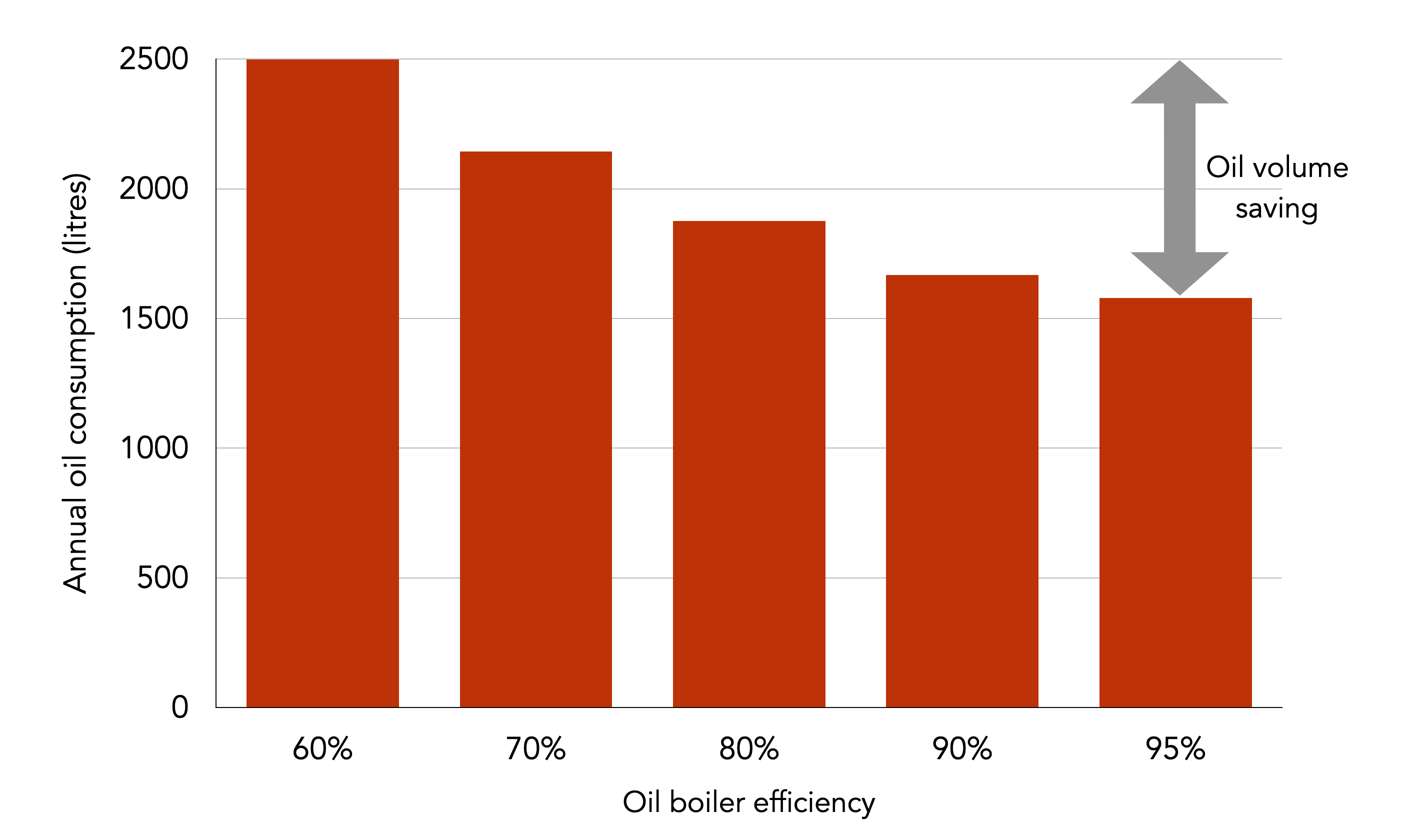
The Relationship Between Annual Heating Oil Consumption and Oil Boiler Efficiency
For many households, the payback for a replacement oil boiler would be measured in months as the savings are so substantial. Savings could be further increased if you seized the opportunity to install a more appropriate oil boiler, in terms of capacity and type, to best suit your particular circumstances. For example, as described in our guide Why Now is the Perfect Time to Upgrade to an Oil Combi Boiler, oil combi boilers can be much cheaper to run than a conventional oil boiler for some households by only heating hot water when it is needed.
Replacing an old boiler has been ranked as the most profitable home improvement by GoCompare and property expert Henry Pryor, as detailed in our guide Replacing Your Boiler is the Most Profitable Improvement According to GoCompare. In other words, a new boiler adds considerably more to the value of a home than the cost of installing it. As shown in the chart below, a new boiler generates much more profit than installing solar panels, for example.
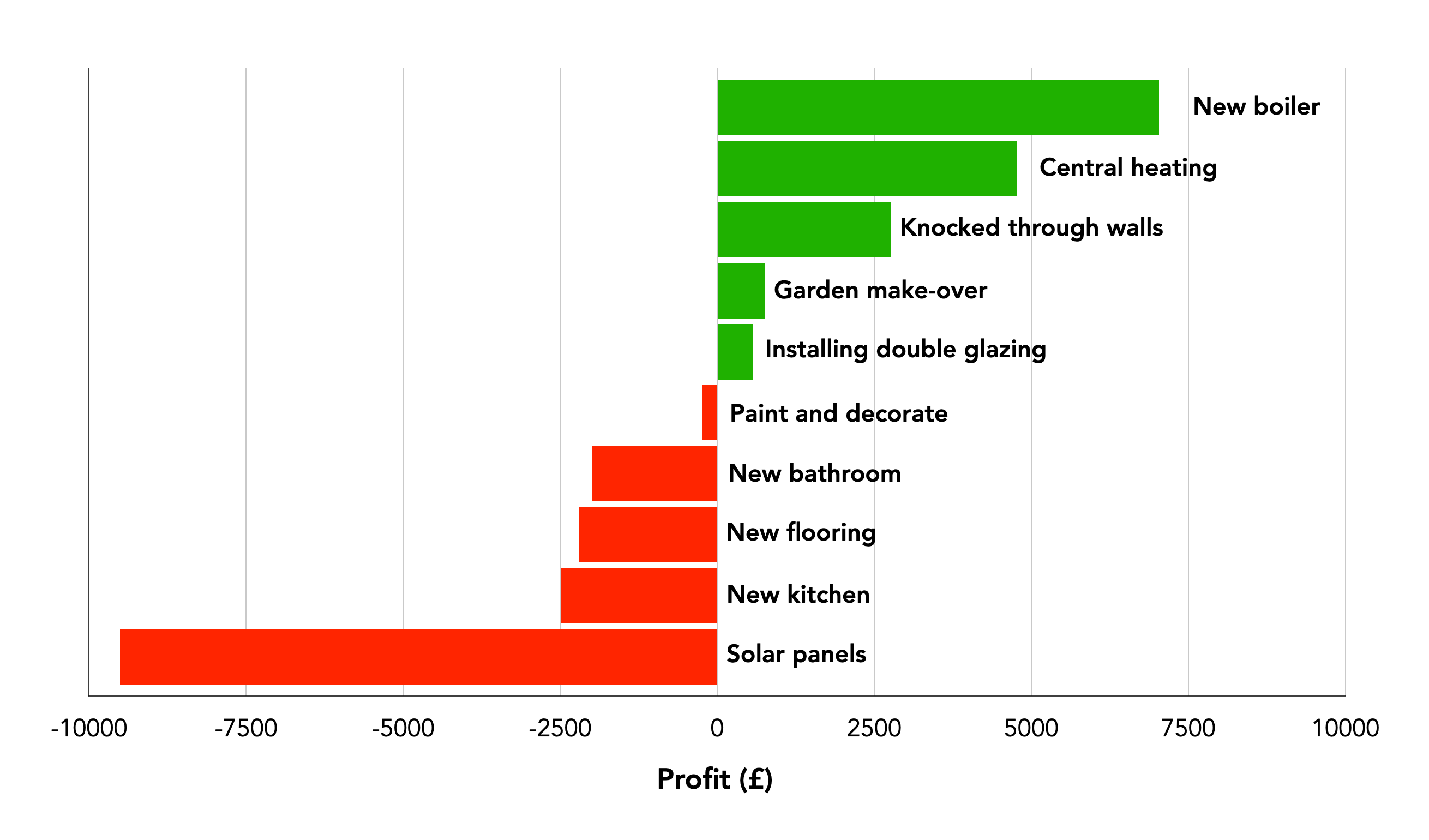
Profit Generated From Different Types of Home Improvement [Source: GoCompare Home Insurance]
We install hundreds of affordable, ultra-efficient oil boilers every year across Cambridgeshire and East Anglia. For more information or to get a no-obligation quote, please visit:
New and Replacement Oil Boilers in Cambridgeshire and East Anglia
Tip 2: Turning your heating thermostat down by just 1°C can cut heating bills by 13%
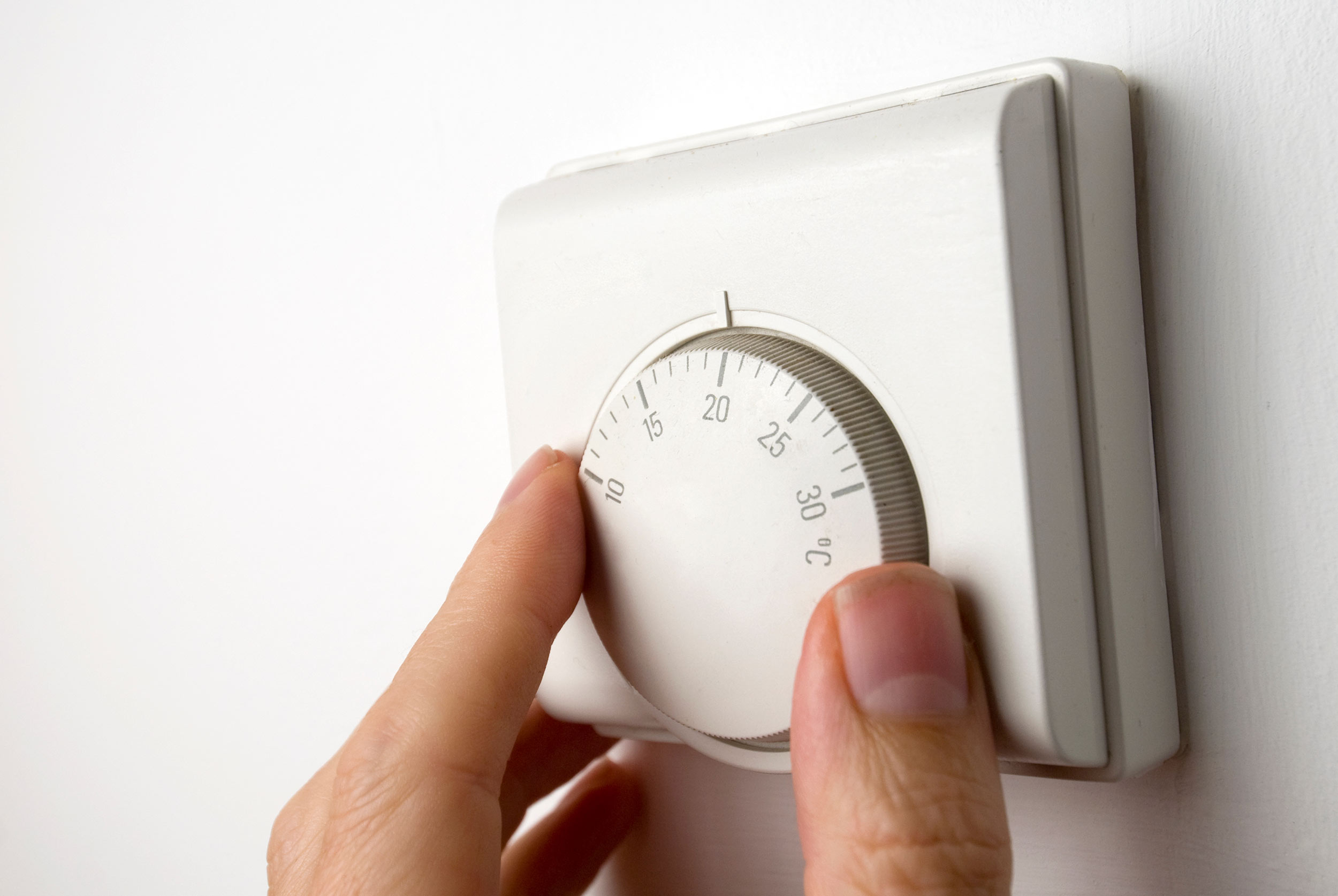
We are always amazed by the huge differences in room temperatures we experience visiting different homes in the region. It can be so tempting to turn up the heat on your thermostat when it gets cold but reducing your central heating thermostat by even a small amount can substantially reduce heating bills.
The Energy Saving Trust advises that you should always set your thermostat to the lowest comfortable setting for occupants. The World Health Organisation (WHO) suggests 18°C is the ideal temperature for healthy and well-dressed people. You may, however, need to increase the temperature for the old, young or unwell. A Uswitch study showed that an estimated 17 million homes (nearly two thirds of households) set their thermostat above 20°C.
Detailed research by Cambridge Architectural Research for the Department of Energy & Climate Change found that reducing the thermostat from 19°C to 18°C would reduce heating bills by 13%. Reducing the thermostat by two degrees, for example from 20°C to 18°C, would reduce heating bills by over 20%.
If you currently have your thermostat set above 18 °C, we recommend trying to turn your thermostat down by 1°C and see how you get on. Then you could try turning it down a little more. If it gets too chilly, you can always turn it up.
What you wear makes a huge difference to how comfortable you feel at different room temperatures. Wearing multiple layers in winter can often allow you significantly turn down your thermostat without feeling cold.
Heating an unoccupied house is, in general, a wasteful use of energy. If your home is unoccupied (if you are away on holiday, for example), we recommend turning your thermostat down to 5°C in winter. This will ensure that pipes do not freeze.
Tip 3: Don’t overheat rooms and avoid heating unoccupied rooms, and fit thermostatic radiator valves
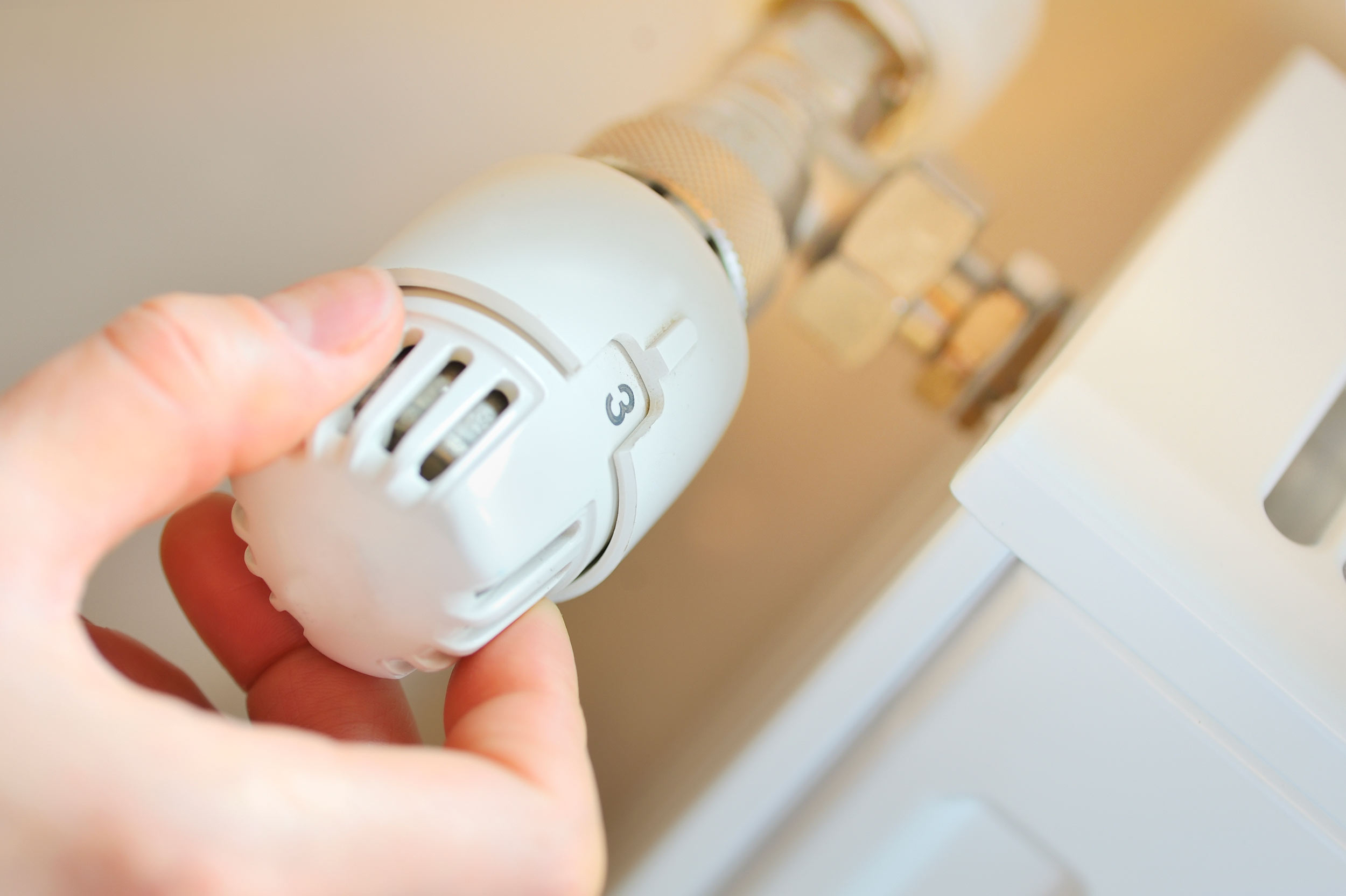
Central heating and radiator systems installed in most houses do not provide the necessary controls to maximise energy efficiency. Having a single system thermostat and radiators that do not have thermostatic radiator valves installed means that there will probably be significant temperature differences in different rooms. Some rooms (for example, rooms that are south facing, have substantial radiator capacity, are well insulated or have additional heat sources) may be overheated, unnecessarily increasing heating bills.
A big advantage of a central heating system is that it can heat all rooms in a house, and many households tend not to adjust their central heating so they are left heating all rooms in a home. Unfortunately, there are many circumstances where this increases heating bills unnecessarily:
- people may only use a small number of rooms in a day, with heating of unoccupied rooms being a complete waste of energy
- spare/guest bedrooms may never be used or used infrequently
- children may be away (for example, at weekends or at university) and yet their bedrooms continue to be heated.
At the very least, we recommend that you install Thermostatic Radiator Valves (TRVs) to as many radiators as you can, if these are not already fitted. These allow you to more easily switch off or turn down radiators in unoccupied rooms. They also provide some degree of control over room temperatures (although you should install smart radiator valves – discussed below – for much better temperature control).
If you have a limited budget, focus installation of TRVs to rooms that:
- have a high chance of being overheated at certain times (for example, rooms that can experience sun coming through windows or where there are additional heating sources, such as a wood burner)
- are unoccupied for significant periods of time (for example, guest bedrooms).
Thermostatic radiator valves make it much easier to avoid overheating rooms but they are only effective if you proactively review their settings regularly to minimise heating bills. It is easy, for example, to forget to switch off radiators in guest bedrooms after guests have left. Also, thermostatic radiators valves provide only limited temperature control. This is why we strongly recommend that you invest in a smart thermostat and smart radiator valves (below) as they achieve the highest possible reductions in heating bills.
We install thermostatic radiator valves in homes across Cambridgeshire and East Anglia. For more information or to get a no-obligation quote, please contact us.
Tip 4: Invest in a smart thermostat and smart radiator valves for overall heating bill savings of up to 40%

Smart technology – in the form of smart thermostat and smart thermostatic radiator valves – can have a huge impact on heating bills because they combine many energy-saving measures and are so easy to use with automated functions to apply these energy-saving measures. The big problem we have with standard system thermostats and standard thermostatic radiator valves is that they need regular attention and adjustment by householders to achieve significant savings. In contrast, smart technology makes it much easier to control your heating (through a mobile phone or tablet app), with constant adjustment performed automatically to maximise energy savings.
Smart thermostats and smart radiator valves provide payback within months while generating substantial savings for many years to come. They are described in more detail in our guide Smart Thermostats and Smart Radiator Valves Can Reduce Heating Bills by 31 to 40% and Cut Harmful Emissions.
A smart thermostat replaces an existing heating system thermostat and any controller/timer system to provide much more advanced features and a much simpler way to control heating (using a mobile phone or tablet). On its own, a smart thermostat can typically save 10-12% on heating bills based on analysis of real homes. Advanced features that save money include being able to change temperatures over time, controlling heating when away from a home and geofencing (so that a home is not heated when occupants are not there).
Householders looking for the best way to reduce heating bills should combine a smart thermostat with smart radiator valves, as this approach will allow control of heating in individual rooms to achieve larger savings. Honeywell claims that its evohome system (comprising a smart thermostat and smart thermostatic radiator valves) can reduce annual heating bills by up to 40%.
Smart radiator valves improve the performance of standard thermostatic radiator valves by accurately measuring room temperature and communicating with a smart thermostat to finely control the heating of individual rooms. They eliminate overheating of rooms (such as those that are south-facing, well-insulated or have additional heating) and allow householders to set different target temperatures in different rooms and at different times of the day. This ensures that only occupied rooms are heated.
We install smart thermostats and smart thermostatic radiators valves in homes across Cambridgeshire and East Anglia. For more information, please visit:
Smart Thermostat and Smart Radiator Valve Installation in Cambridgeshire
Tip 5: Pay the lowest price for heating oil by finding the best supplier and filling up at the best time(s) of the year
Oil heating has two huge advantages. Firstly, you can purchase heating oil from any supplier you choose every time you fill your oil tank up. Secondly, the ability to store heating oil gives you flexibility on when you buy heating oil, so you can avoid busy periods when prices are higher.
Our detailed guide Where and When to Buy Heating Oil to Save £100s Per Year shows that it is possible to make substantial savings on heating oil every year.
Get quotes from a range of suppliers directly, rather than just relying on a single online broker such as Boilerjuice. While online brokers have become popular, we have found that individual suppliers can often give better prices, and many now provide online quotes. When we compared pricing among suppliers, we were surprised by the range of prices, as shown in the chart below (for 500 litres). At the time, we found NRG to be significantly cheaper than the other six providers we asked. The cheapest quote was nearly 20% cheaper than the most expensive quote so it definitely pays to shop around.
 Quotes for 500 litres of home heating oil (inclusive of VAT)
Quotes for 500 litres of home heating oil (inclusive of VAT)
If you can, avoid ordering oil in periods when demand for heating oil is high. There are, in general, seasonal effects with prices, and oil companies often charge significantly more for ’emergency’ deliveries compared with standard deliveries with longer lead times. According to Crown Oil, generally speaking, summer is the best time to buy heating oil. Crown Oil says that you can expect prices to go up during periods of high demand, such as the winter, when most households are filling up their tanks to stay warm. Crown Oil’s own analysis of heating oil prices found that August prices were on average 14% cheaper than in December. We recommend monitoring your oil usage regularly, for example using a wireless Watchman oil tank gauge, to avoid needing an expensive ’emergency’ delivery.
Tip 6: Replace old, inefficient radiators with sleek, ultra-efficient replacements to reduce heating bills by 10-20%
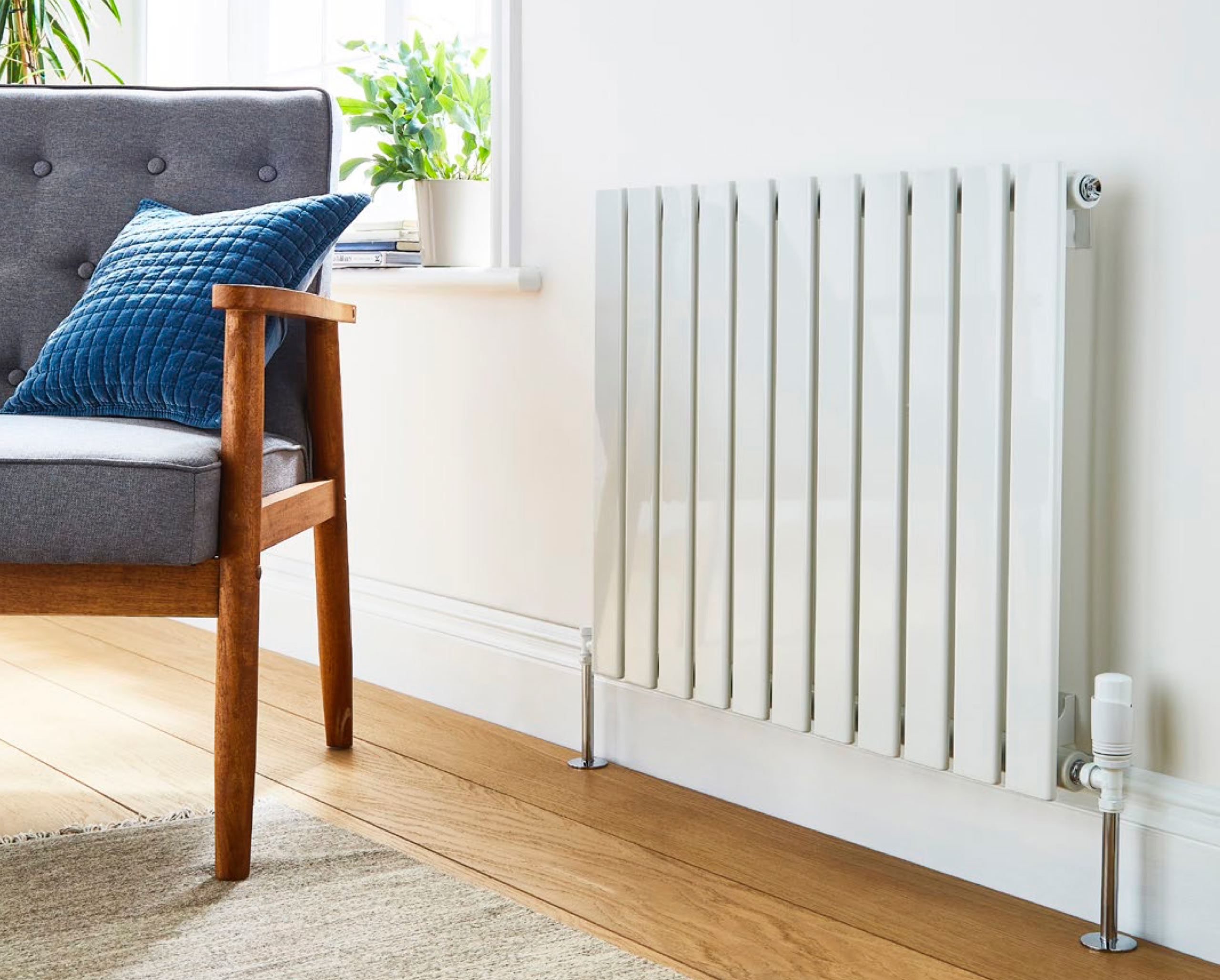
Replacing your old radiators could reduce heating bills by 10 to 20%. Radiators play a critical role in your heating system by transferring heat from hot water (coming from the boiler) to the air in a room. Radiator design has improved hugely over the last 20 years in terms of heating performance and energy efficiency. Furthermore, the performance of older radiators can deteriorate significantly due to rusting and sludge. As described in our article Replacing Radiators Can Add £10,000 to the Value of Your Home and Cut Heating Bills, new ultra-efficient radiators can double the heating efficiency of old radiators.
As well as substantial heating bill savings, replacement radiators increase the value of your home. According to furniture retailer ScS and webuyanyhouse.co.uk, replacement radiators can add £10,000 to a house’s value, as prospective home purchasers strongly value homes that are energy efficient. With energy prices expected to stay high until 2030 and beyond, the attractiveness of properties that are energy efficient can only increase.
We install ultra-efficient replacement radiators valves in homes across Cambridgeshire and East Anglia. For more information, please visit:
New and Replacement Radiators in Cambridgeshire
Tip 7: Power flush your central heating system to reduce bills by 20%
Power flushing your central heating system is one of the most affordable ways to significantly reduce your heating bills. Not only this, but power flushing will prolong the life of your existing boiler, radiators and pipework.
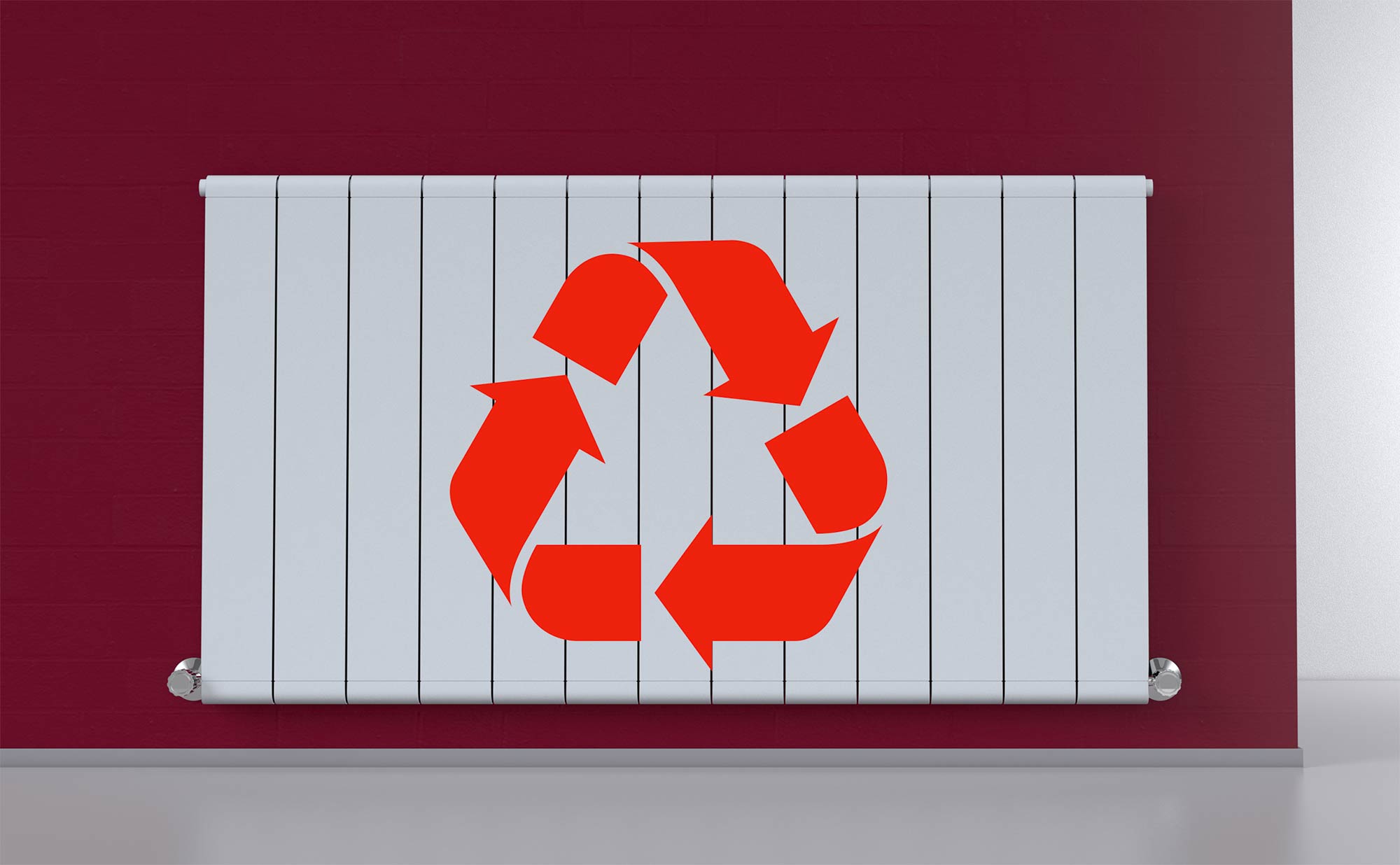
Accumulated limescale, sludge and debris in boilers, radiators and pipework significantly reduce heating performance over time. According to Which?, a sludged heating system can increase annual heating bills by 25%. Clogged boilers are also a leading cause of boiler breakdowns and premature replacement of boilers, radiators and pipes. According to British Gas, 87% of boiler breakdowns are due to dirty water.
We offer an affordable same-day power flushing service, using the latest technology to leave your central heating system in top-top condition. For more information, please visit:
Central Heating Power Flushing in Cambridgeshire
Combining these tips could easily halve heating bills
The heating cost savings achievable with each individual tip are significant in their own right. However, combining tips would have a massive effect on annual heating bills. Even with conservative assumptions and assuming you don’t do everything listed, you could reasonably expect to halve your annual heating bills. Over 10 or 20 years, cumulative savings would be massive, and many times the initial outlay, even based on heating cost savings alone. If you also factor in increases to the value of your home, the case for these energy-efficient tips is compelling. Unlike the installation of solar panels – where the look of solar panels on a roof could potentially put off some buyers – we believe that the home improvements outlined in this guide have much more universal appeal and, therefore, would better translate to higher house price valuations.
If you would like more information about the services we offer, please contact us.
This guide is one of a number that we have written to help you reduce your heating bills. To view more of our guides, please visit:

